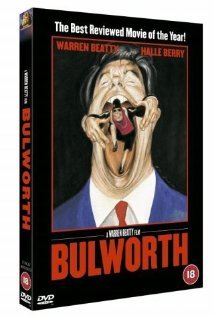“Speaking Your Mind”

| None | Light | Moderate | Heavy | |
|---|---|---|---|---|
| Language | ||||
| Violence | ||||
| Sex | ||||
| Nudity |
Content:
(H, Pa, So, LLL, V, S, A, DD, M) Humanist worldview with pagan elements of suicidal man; 91 obscenities & 5 profanities; mild violence including man shot; implied adultery & sexual situations; no nudity; alcohol use; smoking & strong drug use shown; and, socialist elements.
More Detail:
Warren Beatty has returned to the screen after a long absence with BULWORTH, an eccentric political farce, which he has co-written, directed, produced, and stars as California Senator Jay Bulworth. The movie goes to extremes in satirizing American political campaigns, creating a cauldron of foul language but offering no solutions to the problems it depicts.
Running for re-election, Senator Bulworth is caught in a stifling climate of apathy and disingenuousness. Realizing that he is not doing well in the polls and weary of the prepared speeches he must recite repeatedly, Bulworth decides to do something worthwhile for his daughter. After taking out a large life insurance policy for her, he hires someone to kill him before the weekend is up (calling it “the research project”). In the meantime, he continues with his final days of campaigning.
Not able to endure the monotonous and inane speeches any longer, Bulworth begins to “tell it like it is.” He lets people know that politicians do not really care about their interests, only in getting votes, and that they manipulate public opinion with costly advertising and marketing. He predicts that the rich people will just keep getting richer and the poor will keep getting poorer. “White people have more in common with black people than with rich people,” he adds. Bulworth begins to hang out in the black communities of Los Angeles and picks up their rap music which he begins to use with his campaigning. Apparently, Bulworth and his wife are not in a loving relationship, so he turns his attention to an attractive young black woman named Nina, played by Halle Berry.
Feeling unburdened and good about himself, Bulworth no longer wants to die but instead has a renewed interest in life. However, he is reminded that someone is out to take his life. In a panic, Bulworth tries to contact the person he contracted with to call “the research project” off.
While having a great message of exposing fraud and being honest, the movie conveys this message in a way that leaves a lot to be desired. The film certainly reflects the sentiments of many Americans: we are tired of listening to politicians make empty promises and phony speeches. Senator Bulworth doesn’t give the audience a nobler alternative, however. Instead, he makes crude, tactless remarks, adopting an “anything goes” philosophy. His desire to be open and honest is good and admirable, but he goes to the extreme in carrying this out.
BULWORTH has funny moments, but the outlandishness is overpowering and sometimes offensive. With such a great concept for a film premise, it is disappointing that greater goals weren’t pursued. To Beatty, the word “more” means more crude language and more outlandish behavior, but from our perspective, more could be more insight, more drama, and more clean comedy. It is also unfortunate and disconcerting that the movie subjects the audience to many foul and crude lyrics in the rap songs. BULWORTH, however, does have the potential to cause audiences to think about the political process and to see how it manipulates and affects their lives.
Running for re-election, Senator Bulworth is caught in a stifling climate of apathy and disingenuousness. Realizing that he is not doing well in the polls and weary of the prepared speeches he must recite repeatedly, Bulworth decides to do something worthwhile for his daughter. After taking out a large life insurance policy for her, he hires someone to kill him before the weekend is up (calling it “the research project”). In the meantime, he continues with his final days of campaigning.
Not able to endure the monotonous and inane speeches any longer, Bulworth begins to “tell it like it is.” He lets people know that politicians do not really care about their interests, only in getting votes, and that they manipulate public opinion with costly advertising and marketing. He predicts that the rich people will just keep getting richer and the poor will keep getting poorer. “White people have more in common with black people than with rich people,” he adds. Bulworth begins to hang out in the black communities of Los Angeles and picks up their rap music which he begins to use with his campaigning. Apparently, Bulworth and his wife are not in a loving relationship, so he turns his attention to an attractive young black woman named Nina, played by Halle Berry.
Feeling unburdened and good about himself, Bulworth no longer wants to die but instead has a renewed interest in life. However, he is reminded that someone is out to take his life. In a panic, Bulworth tries to contact the person he contracted with to call “the research project” off.
While having a great message of exposing fraud and being honest, the movie conveys this message in a way that leaves a lot to be desired. The film certainly reflects the sentiments of many Americans: we are tired of listening to politicians make empty promises and phony speeches. Senator Bulworth doesn’t give the audience a nobler alternative, however. Instead, he makes crude, tactless remarks, adopting an “anything goes” philosophy. His desire to be open and honest is good and admirable, but he goes to the extreme in carrying this out.
BULWORTH has funny moments, but the outlandishness is overpowering and sometimes offensive. With such a great concept for a film premise, it is disappointing that greater goals weren’t pursued. To Beatty, the word “more” means more crude language and more outlandish behavior, but from our perspective, more could be more insight, more drama, and more clean comedy. It is also unfortunate and disconcerting that the movie subjects the audience to many foul and crude lyrics in the rap songs. BULWORTH, however, does have the potential to cause audiences to think about the political process and to see how it manipulates and affects their lives.


 - Content:
- Content: 





